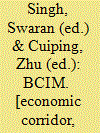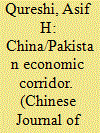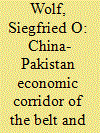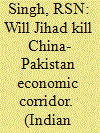|
|
|
Sort Order |
|
|
|
Items / Page
|
|
|
|
|
|
|
| Srl | Item |
| 1 |
ID:
159709


|
|
|
|
|
| Publication |
New Delhi, Adroit Publishers, 2017.
|
| Description |
xxiv, 340p.hbk
|
| Standard Number |
9788187393375
|
|
|
|
|
|
|
|
|
|
|
|
Copies: C:1/I:0,R:0,Q:0
Circulation
| Accession# | Call# | Current Location | Status | Policy | Location |
| 059423 | 382.51054/SIN 059423 | Main | On Shelf | General | |
|
|
|
|
| 2 |
ID:
142121


|
|
|
|
|
| Summary/Abstract |
This paper focuses on the China/Pakistan Economic Corridor (CPEC) arrangement between Pakistan and China from a legal and policy standpoint. It takes into account the Chinese Silk Road Economic Belt and 21st Century Maritime Silk Road Vision under which CPEC is set. The paper highlights the relevance of the application of both Pakistani law and international law to CPEC. In particular the paper focuses on some fundamental legal questions, for example the very legal character of CPEC. The discussion on the fundamental legal questions is followed by the various streams of legal frameworks that have a bearing on CPEC including the Pakistani Constitution and world trade and international investment norms. The purpose of this paper is to provide a framework of issues raised by CPEC. It is not intended as an exhaustive analysis of all the issues raised.
|
|
|
|
|
|
|
|
|
|
|
|
|
|
|
|
| 3 |
ID:
172646


|
|
|
|
|
| Publication |
Switzerland, Springer Nature, 2020.
|
| Description |
xvii, 395p.hbk
|
| Contents |
(B)
|
| Standard Number |
9783030161972
|
|
|
|
|
|
|
|
|
|
|
|
Copies: C:1/I:0,R:0,Q:0
Circulation
| Accession# | Call# | Current Location | Status | Policy | Location |
| 059890 | 338.95491/WOL 059890 | Main | On Shelf | General | |
|
|
|
|
| 4 |
ID:
180240


|
|
|
|
|
| Summary/Abstract |
The growth of economic corridors in developing regions has become instrumental in boosting economic growth and infrastructure. Economic corridors integrate existing road and rail networks to build effective multimodal transportation networks within a particular geographical setting with the aid of quality distribution networks, logistics and infrastructure. This helps in interlinking various markets and production centres of respective countries. This article investigates the influence of economic corridors in promoting sustainable as well as economic development in the South Asian region. The primary data for the article was collected using semi-structured questionnaires for local respondents and interviews that were conducted with key informants across South Asian region.
|
|
|
|
|
|
|
|
|
|
|
|
|
|
|
|
| 5 |
ID:
160241


|
|
|
|
|
| Summary/Abstract |
The Sino-Pakistani relationship illustrates a truly relational identity. It involves two relational selves constituting each other, and the formation of the China-Pakistan Economic Corridor (CPEC) independently constituting each of them. Both the study and the presentation of this relational identity are only possible under an epistemology of relationality, as opposed to the epistemology of the self-interested actor. The article enlists the anthropological notion of post-Chineseness, which typologises relationality in accordance with how Pakistan and China identify each other in their strategic choice of relationship. It finds that China has moved from its expectations of Pakistan as being an owner of physical Chineseness, through hybrid Chineseness, and ultimately progressing to moral Chineseness under the CPEC. By contrast, Pakistan’s self-positioning vis-à-vis China has shifted from the ownership of physical Chineseness, via experiential Chineseness, to moral Chineseness. Among them, experiential Chineseness is the most relevant element in explaining the changing bilateral relationships under the epistemology of relationality. It is the spontaneous rise of intimacy, or friendship, made possible by the long-term process of a collegial working relationship.
|
|
|
|
|
|
|
|
|
|
|
|
|
|
|
|
| 6 |
ID:
146587


|
|
|
|
|
| Contents |
The Chinese have aggressively involved themselves in Myanmar yet they are unsure of their future relationship and their investments due to the oncoming democratically elected government. Chinese involvement in Myanmar has been viewed with a great deal of hostility by the locals, as they perceive that the Chinese have exploited their country through corrupt deals and benefitted themselves more than anyone in Myanmar. Consequently, Chinese investment fell from $12 billion in 2008- 2011 to just $407 million in 2012-2013. This resentment has forced the current government to renegotiate most of their major projects to get better terms for themselves. China is also wary of the NLD leader's proximity to the West (US) and its allies like Japan and South Korea. Thus China would have to fight tooth and nail to retain her influence in Myanmar and Safeguard her national interest.
|
|
|
|
|
|
|
|
|
|
|
|
|
|
|
|
| 7 |
ID:
137849


|
|
|
|
|
| Summary/Abstract |
While Pakistan has described the recent visit of Chinese President Xi Jinping as fate-changing event, it is much the same for India. Addressing the joint session of the Pakistan Parliament, Jinping said that, “China’s friendship with Pakistan is transforming into a strategic partnership for mutual benefit.”
|
|
|
|
|
|
|
|
|
|
|
|
|
|
|
|
| 8 |
ID:
169142


|
|
|
|
|
| Summary/Abstract |
In the Mekong Region, the Asian Development Bank and partners have promoted economic corridors as a way to achieve regional economic integration and growth. This study evaluates how a transboundary policy narrative of shared prosperity around the East–West Economic Corridor programme emerged, and then how it was elaborated and used, taking a set of border policies of the government of Thailand as cases. For two decades the shared prosperity narrative has been used by a coalition of elite actors to support a programme of investments in road infrastructure, as well as to push for agreements on trade, border logistics, investment and tourism. The shared prosperity narrative has helped maintain support for the programme despite its failures to meet projections and expectations. Although criticised by civil society and experts from time to time, no coherent shared counter‐narrative emerged. Policy elites in Thailand have used the transboundary narrative to justify investments in special economic zones, and transport infrastructure near the border and inside neighbouring countries. Thailand has also reproduced the narrative in support of efforts to bolster tourism cooperation, and negotiate cross‐border trade and logistics agreements. Roads and bridges have been built, underlining how discursive practices have material consequences and reinforce the narrative.
|
|
|
|
|
|
|
|
|
|
|
|
|
|
|
|
| 9 |
ID:
146030


|
|
|
|
|
| Summary/Abstract |
The authors analyze results of meetings among the three countries' leaders held in Dushanbe in September 2014 and in Ufa in July 2015. They examine challenges arising in the course of the development of new international routes as part of the China's Silk Road Economic Belt initiative. The possibilities of integrating the three countries development strategies are revealed on the basis of the establishment of the Russia-Mongolia-China Economic Corridor. Main fields of joint cooperation are mapped out.
|
|
|
|
|
|
|
|
|
|
|
|
|
|
|
|
| 10 |
ID:
155974


|
|
|
|
|
|
|
|